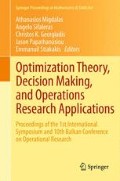Abstract
We develop a Markov-based optimization model that captures the process via which a risk-averse firm in Greece decides whether to engage in tax evasion. The firm seeks to maximize the expected utility of its wealth, the latter viewed as a function of the portion of profits which the firm attempts to conceal from the government. Our model takes into account the basic features of the Greek tax system, including random audits and tax penalties applied when the audit reveals any wrongdoing. The proposed model is used to (1) show that the parameters currently in place are conducive to tax evasion and (2) “chart” the problem’s parameter space in order to identify “virtuous” combinations (from the point of view of the government), and obtain a relationship between audit probability, tax penalty and likelihood of the firm engaging in tax evasion.
Access this chapter
Tax calculation will be finalised at checkout
Purchases are for personal use only
Notes
- 1.
The word “firms” refers to incorporated entities in Greece, operating according to the general accounting principles commonly known in Europe as S.A.—Société Anonyme).
References
Allingham, P., Sandmo, H.: Income tax evasion: a theoretical analysis. J. Public Econ. 1(6), 988–1001 (1972)
Baldry, J.C.: Tax evasion and labour supply. Econ. Lett. 3, 53–56 (1979)
Bhattacharya, S., Xu, D., Kumar, K.: An ANN-based auditor decision support system using Benford’s law. Decis. Support Syst. 50, 576–584 (2011)
Clotfelter, C.T.: Tax evasion and tax rates: an analysis of individual returns. Rev. Econ. Stat. 65, 363–373 (1983)
Eide, E.: Tax evasion with rank dependent expected utility. Unpublished paper, University of Oslo, Department of Private Law (2002) eale2002.phs.uoa.gr
Feld, L.P., Schneider, F.: Survey on the shadow economy and undeclared earnings in oecd countries. German Econ. Rev. 11, 109–149 (2010)
Frey, B., Feld, L.P.: Deterrence and morale in taxation: an empirical analysis. CESifo working paper, 760 (2002)
Gordon, J.P.F.: Individual morality and reputation costs as deterrence to tax evasion. Eur. Econ. Rev. 33, 797–805 (1989)
Goumagias, N., Hristu-Varsakelis, D., Saraidaris, A.: A decision support model for tax revenue collection in Greece. Decis. Support Syst. 53(1), 76–96 (2012)
Greek Secretariat for Information Systems: Statistical report of tax data for the 2009 fiscal year (in Greek) (2009)
Hindriks, J., Keen, M., Muthoo, A.: Corruption, extortion and evasion. J. Public Econ. 88, 161–170 (1996)
Kanellopoulos, K., Kousoulakos, I., Rapanos, B.: The underground economy in Greece: What official data show. Greek Econ. Rev. 14, 215–236 (1992)
Kydland, F.E., Prescott, E.C.: Dynamic optimal taxation, rational expectations and optimal control. J. Econ. Dyn. Contr. 2, 79–91 (1980)
Nigrini, M.J.: A taxpayer compliance analysis of benford’s law. J. Am. Taxat. 18(1) (1996)
Polinsky, A.M., Shavell, S.: The optimal tradeoff between the probability and magnitude of fines. Am. Econ. Rev. 69(5), 880–891 (1979)
Tatsos, N.: Economic fraud and tax evasion in greece (in Greek). Papazisis Publishings (2001)
Author information
Authors and Affiliations
Corresponding author
Editor information
Editors and Affiliations
Rights and permissions
Copyright information
© 2013 Springer Science+Business Media New York
About this paper
Cite this paper
Goumagias, N.D., Hristu-Varsakelis, D. (2013). A Markov-Based Decision Model of Tax Evasion for Risk-Averse Firms in Greece. In: Migdalas, A., Sifaleras, A., Georgiadis, C., Papathanasiou, J., Stiakakis, E. (eds) Optimization Theory, Decision Making, and Operations Research Applications. Springer Proceedings in Mathematics & Statistics, vol 31. Springer, New York, NY. https://doi.org/10.1007/978-1-4614-5134-1_15
Download citation
DOI: https://doi.org/10.1007/978-1-4614-5134-1_15
Published:
Publisher Name: Springer, New York, NY
Print ISBN: 978-1-4614-5133-4
Online ISBN: 978-1-4614-5134-1
eBook Packages: Mathematics and StatisticsMathematics and Statistics (R0)

